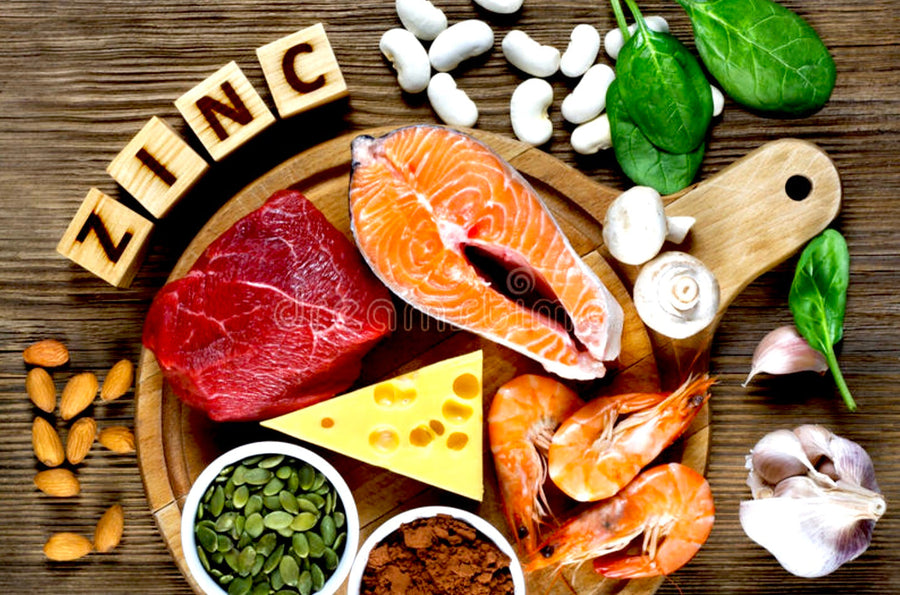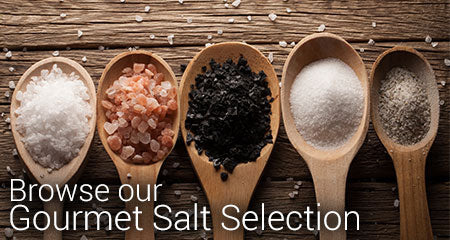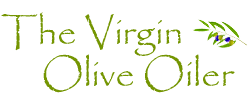Why Is Zinc So Important? - Blog # 80

Hello Everyone! Welcome back to another Friday blog. Today I wanted to highlight the importance of zinc. Zinc (Zn) deficiency is prevalent worldwide. The World Health Organization (WHO) reports that one-third of the world’s population are at risk for zinc deficiency. Zinc is involved in >300 enzymatic reactions in the body and > 1,000 biological reactions. We are almost ALL zinc-deficient - for a number of reasons. Let’s delve in.
Zinc is absent from most foods we are consuming. Our body can’t store it, so it must be taken in daily. We are consuming phytates that bind zinc, making it unavailable for all those enzymatic functions. Many drugs interfere with zinc, such as antacids/PPI’s (proton pump inhibitors) - they block the stomach's production of hydrochloric acid and pepsin required to separate zinc from proteins absorbed. Metformin, an anti-diabetic drug, interferes with zinc transport and aspirin blocks zinc transporters. Our soil is depleted from vital nutrients due to glyphosate and agriculture farming practices - microbes are significantly impacted and can't extract nutrients from the soil. Plants end up severely depleted of vitamins, minerals and phytochemicals. Some estimates are that our fruits and vegetables have roughly 40-50% less nutrition than they had 50 years ago. “Glyphosate binds (chelates) vital nutrients such as iron, manganese, zinc, and boron in the soil, preventing plants from taking them up.”
“Zinc is the second most abundant micronutrient in the human body after iron (Fe). Based on bioinformatics research, approximately 2800 human proteins are presumed to bind zinc.” Zinc is heavily involved in the function of the immune system, neurological function, hormone production, gene expression, taste and smell, vision, DNA repair, transcriptional regulation, cell migration, protein degradation, signal transduction, actin targeting (muscle), brain function and numerous other processes. Holy Moly! In addition, zinc has antioxidant and anti-inflammatory properties and can destroy some viruses directly. Zinc absorption takes place in the small intestine by enterocytes. If you have gastrointestinal issues - like celiac, ulcerative colitis, irritable bowel, SIBO (small intestinal bacterial overgrowth) or SIFO (small intestinal fungal overgrowth) - you are not able to absorb nutrients very well. “An imbalanced zinc status or deficiency of this micronutrient is associated with severe health consequences, which causes high morbidity.”
How do you know if you are zinc-deficient? You can get a blood test - but understand that you are looking at only 0.2% in plasma. So, where is MOST zinc in the body?

Our muscles and bones sequester roughly 86% of zinc! 😳 Hmm…wonder if that is important? What do you think will happen if you take a statin drug that causes muscle damage? They’ve known since 2005 that “statin treatment was associated with a significant reduction in mean serum zinc and copper (Cu) by 9%." Knowing that this reflects only 0.2% - is HUGE! “Insufficient dietary intake of Zn, low plasma Zn concentrations and an altered Cu:Zn ratio is related to modified fatty acid profile in subjects with dyslipidemia. Plasma Zn status was associated with obesity.” So, Zinc deficiency is linked to high blood pressure, cardiovascular disease, imbalance in cholesterol, metabolic syndrome and obesity!
Add aspirin to the situation - it blocks prostaglandin, the transporter of zinc, So, it inhibits zinc from being carried to all the tissues that require it. Aspirin is not innocuous. Metformin and other drugs are not innocuous. Zinc deficiency - is related to SO MANY issues - allergies, skin rashes, slow wound healing, lowered immune response, loss of taste and smell, macular degeneration, Alzheimer’s, NAFLD (non-alcoholic fatty liver disease), T2D (type 2 diabetes), HTN (hypertension) and many other disease processes.
Zinc is also very involved in the immune system and the hormonal system. Low zinc in men leads to hypogonadism and low testosterone. Low zinc in post-menopausal women cause low testosterone as well. “The use of zinc supplementation in the intervention group significantly improved sexual desire, arousal, orgasm, satisfaction, vaginal moisture, and pain during intercourse and also the overall score of sexual function compared to the control group.” “In our studies in an experimental human model of zinc deficiency, we documented decreased serum testosterone level, oligospermia, severe immune dysfunctions mainly affecting T helper cells, hyperammonemia, neurosensory disorders, and decreased lean body mass. It appears that zinc deficiency is prevalent in the developing world and as many as two billion subjects may be growth retarded due to zinc deficiency.”
“Approximately 90% of the zinc present in the brain is protein-bound, contributing to the function of over 2000 proteins. Indeed, zinc acts as a cofactor for over 300 enzymes, and, in the hippocampus alone, changes in cytosolic zinc can modulate the expression of over 900 genes, many of which are linked to the cell cycle, neurite extension, and synaptic growth.” Zinc is important for mitochondrial function in all tissues - the muscles and heart housing the highest levels of mitochondria in the body. However, mitochondria are also found in high numbers in neurons - at up to 2 million per neuron! Mitochondria produce energy in the form of ATP (adenosine triphosphate). “It has been estimated that individual cortical neurons use approximately 4.7 billion ATP molecules per second compared to the 10 million ATP molecules used by non-neuronal cells in the human brain. There is a spot for Mg (magnesium) on ATP that activates it and makes it available for energy. Fun fact - our body makes ~140lbs of ATP/day - which we use up to drive all processes in the body. If ATP production is interfered with - you can see how brain fog, migraines, Alzheimer’s, Parkinson’s, dementias and other brain malfunctions happen.
Fun fact - there are an estimated 37 quintillion (that’s 18 zeros or a billion-billion) chemical reactions in the body every second. 😳 Every one of these require cofactors - vitamins and minerals are the helpers in all these reactions - like a key in an ignition. Understand that 1/3 of our DNA codes for enzymes. We can see how crucial it is to have adequate levels of zinc, magnesium, potassium, selenium, iodine, manganese, chromium and many other minerals and vitamins to accomplish these reactions - and how deficiency leads to disease processes - such as breast and prostate cancers.
“Zinc dysregulation has been linked to increased risk for depression and has been implicated in several neurodegenerative diseases, including Alzheimer’s disease (AD), amyotrophic lateral sclerosis (ALS), and Parkinson’s Disease (PD).” Migraines are caused by mitochondrial dysfunction. In a clinical trial published in Nutrition J. 2020, researchers stated: “Severe zinc deficiency can lead to neurological disorders including attention deficit disorder, lethargy, memory impairment, and learning difficulties. Also, it has been shown that low serum concentrations of zinc are positively associated with migraine attacks. Given the inflammatory nature of migraine and contributing to the oxidative stress in this disorder, zinc may have a favorable effect on migraine attacks.”
Mitochondrial dysfunction is linked to almost all chronic, non-communicable diseases. “Under physiological conditions, zinc likely regulates mitochondrial processes in all tissues…There is also evidence to suggest that hepatic zinc deficiency can inactivate mitochondrial biogenesis and DNA replication, leading to decreased expression of mitochondrial respiratory complexes I, III, and IV and decreased production of reactive oxygen species (ROS).” Our mitochondria produce ROS that kill pathogens - as well as antioxidants to protect themselves and us. We normally think of ROS as being bad - but they are required to kill pathogens. If you are low in zinc, you will likely get sick much more frequently. Since mitochondria are producing our energy - is it really a surprise that we are SO TIRED? Go to google and type in “why am I” - it will auto-fill “so tired.”
Okay, zinc has thousands of jobs - we require zinc on a daily basis - our soil is depleted in all minerals by >50% due to glyphosate - our veggies are lacking these trace minerals - so, how do we get enough Zn and what depletes Zn? "Phytate present in staple foods like cereals, corn and rice, has a strong negative effect on zinc absorption from composite meals.” Phytates have high affinity and strongly bind zinc and make it unavailable to the body. These include whole grains and cereals, beans and legumes - this is why you need to soak your beans overnight to remove most of the phytates - some nuts and seeds and some fruits are also high. You can remove most of the phytates by sprouting or fermenting. So, what can we do to ensure we are getting enough zinc?
- Enhance stomach acid - stop using an antacid/PPI to allow zinc and other nutrients to be separated from protein for absorption. Take a pinch of Celtic or Himalayan sea salt with water, take ACV (apple cider vinegar) in water, or lemon in water prior to meals. Don't drink water with your meal - it dilutes the stomach acid and stops the breakdown of proteins into their amino acids for absorption.
- Increase Intestinal Function - Omega 3’s From Fish Oil - This stimulates the intestinal enzyme intestinal alkaline phosphatase to disable bacterial LPS (lipopolysaccharides) - a waste product/toxin of pathogenic bacteria that cause endotoxemia - and prevents them from leaking out into the rest of the body by maintaining the integrity of the mucin layer. When our body kills off pathogens, the toxins released are LPS.
- Fix Gut - If your gut is inflamed, you aren’t going to absorb Zinc, since it is absorbed in the small intestine. Eat foods high in polyphenols and flavonoids that feed the good microbes and inhibit the pathogenic ones. Include fermented vegetables - sauerkraut is a rockstar - include kefir and cultured foods - take a good probiotic and consume plenty of fiber for your gut microbiome.
- Lower Phytates - they bind zinc and make it unavailable. “Nutritional deficiency of zinc in the developing countries is caused by ingestion of high cereal protein intake, rich in phytate (an organic phosphate compound), which makes zinc unavailable for absorption.” Remove wheat, grains and cereals. Be mindful of bean/legume consumption - soak them prior to cooking and rinse after cooking to remove phytates. Sprout your nuts and seeds - sprouted raw pumpkin seeds are a rich source of zinc.
- Supplement Trace Minerals - they all work together as cofactors for enzymes. You want the right balance. Celtic, Baja gold, and Himalayan Sea salt are high in trace minerals in perfect balance and lower in sodium. You can also get a good quality zinc supplement as well as magnesium - which we are nearly all deficient in as well.
- Green Tea - Not only is green tea high in polyphenols, but in magnesium - the authors of the study purport they work together. The highest polyphenol source was green teas from India. “Pu-erh teas (less antioxidants and Mg) were the best source of iron and zinc. The iron level determined in them (13.32 µg/100 mL) was over 7-fold higher than that in white and yellow tea infusions, and the zinc level (86.7 µg/100 mL) exceeded the content of this element determined in the oolong tea infusion by almost 10 times. A much higher (several times) content of iron and zinc in the leaves of pu-erh tea, as compared to other tea types.”
- Fresh Herbs - Oregano has the highest content of magnesium and zinc, so it is a great way to supplement your diet - add to salads, chicken, fish, meats - make an oregano tea…Add marjoram, rosemary, thyme, basil and other herbs to your foods to boost Zn levels. These are also detoxifiers for the body!
- Polyphenols - In a study on tea, specifically comparing green to black tea, they “demonstrated that a significantly reduced susceptibility of various illnesses was observed when polyphenols were consumed at a level above 500 mg and, in certain cases, 900 mg a day, because such doses determine the observation of a positive biological effect of their action…The group of green teas was the best source of phenolic compounds (110.73 mg/100 mL) and magnesium (1885 µg/100 mL) and was also characterised by the highest antioxidant activity (59.02%).” Consumption is 3-4C/day. One of the most potent polyphenols in green tea is EGCG (epigallocatechin gallate), with powerful anti-inflammatory properties. I’ll discuss EVOO polyphenols below.
- Lower Stress - Chronic stress will undo all your hard work toward getting healthy. Taking action to avoid stress - utilize deep breathing, yoga, meditation and hot and cold therapies.
- Exercise - This is super important for nearly every function in the body - increase blood flow, digestion, oxygenation of tissues, muscle function, mitochondrial function and much more. Shoot for at least 30 minutes daily. Use resistance to enhance muscle function and prevent sarcopenia (muscle loss). Take a walk after dinner. Move your body.
- Prioritize Sleep - Get to bed on time - 9:30-10pm - this gives our glymphatic system time to clean and wash the brain. Most happens between 9:30-12pm. - avoid eating (at least 3 hours) before bedtime - sleep in dark, quiet and cool room. Supplement magnesium at night or take an Epsom salt bath.
- HP-EVOO - high polyphenol extra virgin olive oil - EVOO enhances the absorption of vitamins and minerals and also contains some zinc, iron, potassium, calcium, sodium, vitamins E and K and even some melatonin. There are >30 known polyphenols in EVOO including Hydroxytyrosol, tyrosol, oleocanthal, oleuropein and more. They go to work in our digestive tract providing nourishment to our microbiome - allowing proliferation of the good microbes and exerting anti-microbial activities on pathogenic microbes. Our good microbes produce many metabolites like butyrate that nourish our enterocytes (represent 80-85% of population) of the intestinal epithelium. “Extra-virgin olive oil affects the gut microbiota by reducing the abundance of pathogenic bacteria, stimulating the growth of beneficial bacteria, and increasing the production of microbially produced short-chain fatty acids (SCFAs), which exert a wide range of anti-inflammatory effects and can modulate the expression of a variety of genes via epigenetic mechanisms." EVOO supports mitochondrial function, immune function, gastrointestinal function and exerts powerful anti-inflammatory protection against oxidative injury. Polyphenols also tell our mitochondria to “uncouple” and divide - making more of themselves to pull the workload. Further, the Oleic Acid in EVOO is converted -by enterocytes in the intestine - to OEA, an endocanabinoid that increases the integrity of the intestinal barrier and is a signaling molecule for satiety.
So, until next time my friends…Drink, Drizzle, Digest HP-EVOO at least 4T raw daily, - use more for cooking and drizzling/pouring onto your food - eat the rainbow of organic or wild-sourced or organic veggies (7-9 C) and low-glycemic fruits (to get the rainbow of gut microbes!) - eat wild-caught, pasture-raised, grass-fed - get plenty of sunshine - supplement magnesium, zinc, vitamin D3 + K2 - get your trace minerals and electrolytes with good sea salt - Celtic is hand-harvested and Himalayan was formed before plastics - eat foods high in lutein - drink your body weight in oz of water - get a good pre/probiotic - consume digestible and indigestible fiber for your gut microbes - adaptogens (such as mushrooms) and methylation donors (kale, beets, spinach, cruciferous, lion’s mane…), marjoram, rosemary, oregano, parsley and other herbs to detox, enhance overall health and reverse aging and disease - exercise your body and mind - add a few minutes of mindful meditation to your day to combat stress - take a hot Epsom salt bath and follow with a cold shower/ice plunge - practice “earthing” as an anti-inflammatory - remove EMF (electromagnetic frequency) devices and blue light - use IR (infrared) from incandescent lighting, non-toxic candle or light a fire to enhance sleep and...turn off the light!! #HP-EVOO
This blog is intended for informational purposes only. Discuss strategies with your Healthcare Practitioner.







Comments (1)
Great blog Julie!